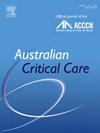“You need to be supported”: An integrative review of nurses’ experiences after death in neonatal and paediatric intensive care
IF 2.6
3区 医学
Q2 CRITICAL CARE MEDICINE
引用次数: 0
Abstract
Background
The death of a child can have a profound impact on critical care nurses, shaping their professional practice and personal lives in diverse, enduring ways. Whilst end-of-life care is recognised as a core component of critical care nursing practice and a research priority, evidence about nurses’ experiences after death in neonatal and paediatric intensive care is poorly understood.
Research question
What is the experience of the nurse after death of a patient in neonatal and/or paediatric intensive care?
Method
Following registration with Open Science Framework, an integrative review of the empirical literature was undertaken. A combination of keywords, synonyms, and Medical Subject Headings was used across the Cumulative Index Nursing and Allied Health Literature (CINAHL) Complete, Medline, APA PsycInfo, Scopus, and Embase databases. Records were independently assessed against inclusion and exclusion criteria. All included papers were assessed for quality. Narrative synthesis was used to analyse and present the findings.
Findings
From 13,018 records screened, 32 papers reporting primary research, representing more than 1850 nurses from 15 countries, were included. Three themes were identified: (i) postmortem care; (ii) caring for bereaved families; and (iii) nurses’ emotional response, which includes support for nurses. Nurses simultaneously cared for the deceased child and family, honouring the child and child–family relationship. Nurses were expected to provide immediate grief and bereavement support to families. In response to their own emotions and grief, nurses described a range of strategies and supports to aid coping.
Conclusion
Recognising neonatal and paediatric critical care nurses' experience after death is key to comprehensively understanding the professional and personal impacts, including the shared grief of a young life lost. Enabling nurses to acknowledge and reflect upon their experiences of death and seek their preferred supports is critically important. Thus, ensuring organisational and system processes similarly align with nurses’ preferences is key.
“你需要得到支持”:新生儿和儿科重症监护室护士死亡后经验的综合回顾。
背景:儿童的死亡会对重症监护护士产生深远的影响,以各种持久的方式塑造他们的专业实践和个人生活。虽然临终关怀被认为是重症护理实践的核心组成部分和研究重点,但关于新生儿和儿科重症监护中护士死亡后经验的证据却知之甚少。研究问题:在新生儿和/或儿科重症监护病人死亡后,护士的经验是什么?方法:在开放科学框架注册后,对经验文献进行综合综述。在累积索引护理和联合健康文献(CINAHL) Complete、Medline、APA PsycInfo、Scopus和Embase数据库中使用了关键词、同义词和医学主题标题的组合。根据纳入和排除标准对记录进行独立评估。所有纳入的论文都进行了质量评估。叙述性综合用于分析和呈现研究结果。结果:从13,018份被筛选的记录中,纳入了32篇报告初步研究的论文,代表了来自15个国家的1850多名护士。确定了三个主题:(i)死后护理;(ii)照顾失去亲人的家庭;(三)护士的情绪反应,包括对护士的支持。护士同时照顾死去的孩子和家人,尊重孩子和孩子与家庭的关系。护士被要求立即为家属提供悲伤和丧亲支持。为了应对自己的情绪和悲伤,护士们描述了一系列帮助应对的策略和支持。结论:认识新生儿和儿科重症护理护士死亡后的经验是全面理解专业和个人影响的关键,包括失去年轻生命的共同悲伤。使护士能够承认和反思他们的死亡经历并寻求他们首选的支持是至关重要的。因此,确保组织和系统流程同样符合护士的偏好是关键。
本文章由计算机程序翻译,如有差异,请以英文原文为准。
求助全文
约1分钟内获得全文
求助全文
来源期刊

Australian Critical Care
NURSING-NURSING
CiteScore
4.90
自引率
9.10%
发文量
148
审稿时长
>12 weeks
期刊介绍:
Australian Critical Care is the official journal of the Australian College of Critical Care Nurses (ACCCN). It is a bi-monthly peer-reviewed journal, providing clinically relevant research, reviews and articles of interest to the critical care community. Australian Critical Care publishes peer-reviewed scholarly papers that report research findings, research-based reviews, discussion papers and commentaries which are of interest to an international readership of critical care practitioners, educators, administrators and researchers. Interprofessional articles are welcomed.
 求助内容:
求助内容: 应助结果提醒方式:
应助结果提醒方式:


